Event Archive: 2015-2016
Did you miss a Clough Center event? Explore our archive below for past event information and visit our YouTube page for videos of recent conferences and lectures.
SPRING 2016 LECTURES & CONFERENCES
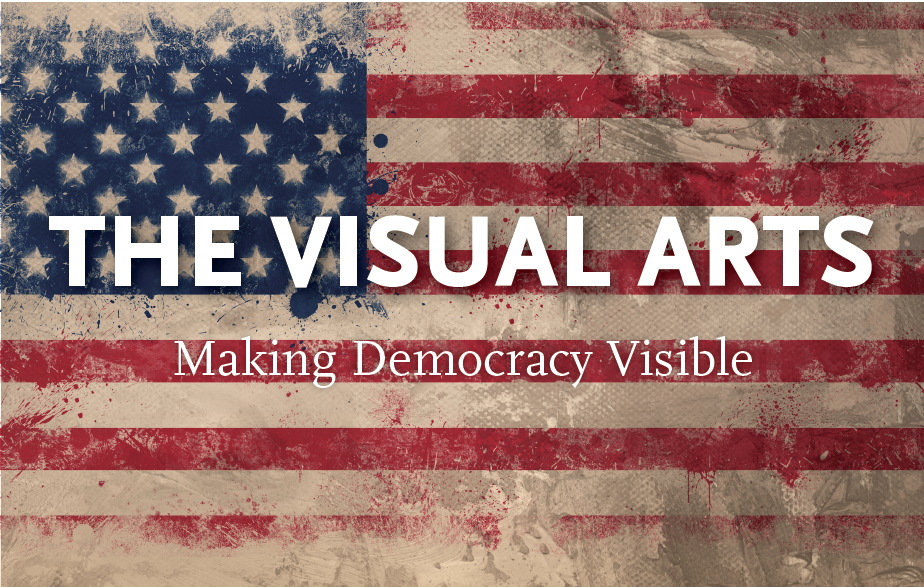
The Visual Arts: Making Democracy Visible
Thursday, January 21, 2016
6:00 p.m.
Devlin Hall, Room 101
Part of "The Arts and the Culture of Democracy" Series.
The visual arts draw our attention to the act of seeing and transfigure what is seen in ways that suggest new patterns in our way of relating to each other. Liza Lou, Ramiro Gomez, Lawrence Weschler and Edward Hirsch discuss the role of contemporary visual arts in creating, defining and critiquing the American democratic vision, and in making explicit what is already implicit in the American landscape.
Edward Hirsch is an American poet and critic. Hirsch is the recipient of an Academy of Arts and Letters Award, an Ingram Merrill Foundation Award, a Lila Wallace-Reader’s Digest Writers’ Award, and the Rome Prize from the American Academy in Rome. In 2008, he was elected a Chancellor of the Academy of American Poets. He currently serves as the president of the John Simon Guggenheim Memorial Foundation.
Hirsch’s first collection of poems, For the Sleepwalkers (1981), received the Delmore Schwartz Memorial Award from New York University and the Lavan Younger Poets Award from the Academy of American Poets. His second collection, Wild Gratitude (1986), won the National Book Critics Award. Since then, he has published six additional books of poems: The Night Parade (1989), Earthly Measures(1994), On Love (1998), Lay Back the Darkness (2003), Special Orders (2008), and The Living Fire: New and Selected Poems (2010), which brings together thirty-five years of poems. Hirsch is also the author of five prose books, including A Poet’s Glossary (2014), Poet’s Choice (2006), How to Read a Poem and Fall in Love with Poetry (1999); and is the editor of Theodore Roethke’s Selected Poems (2005) and co-editor of The Making of a Sonnet: A Norton Anthology (2008).
Hirsch has been was awarded fellowships from the Guggenheim Foundation, the MacArthur Foundation, and the National Endowment for the Arts. Hirsch taught for six years in the English department at Wayne State University and seventeen years in the Creative Writing Program at the University of Houston. Hirsch was educated at Grinnell College and the University of Pennsylvania, where he received a Ph.D. in Folklore.
Ramiro Gomez is a Los Angeles-based artist who lives and works in West Hollywood, CA. His works focus on the predominantly Hispanic workforce present behind the imagery of affluence and beauty in California. In 2014, Gomez held his first solo gallery show at the Charlie James Gallery. His exhibition, entitled Domestic Scenes, united three series of paintings in a mediation on class, wealth, and the people behind America’s images of luxury.
In 2013, Gomez held a solo exhibition at the UCLA Chicano Studies Research Center entitled Luxury, Interrupted. Also in 2013, he was an artist-in-residence at the CSUF Grand Central Art Center and the City of West Hollywood Park. The origins of Gomez’s work are located in his personal history, as Gomez was born to immigrant parents in Southern California. After leaving the California Institute of the Arts, Gomez worked as a live-in nanny with a Beverly Hills family, where he observed the often-paradoxical relationships between heads of households and their staff.
Gomez has also exhibited at the Cornell Fine Arts Museum, the Museum of Contemporary Art San Diego, the District of Columbia Arts Center at Washington D.C., and the AFL-CIO National Convention. He has guest lectured on his work at Stanford University, UCLA, UC San Diego, UC Santa Barbara and the AFL-CIO National Convention.
Liza Lou is an American visual art best known for producing large scale sculptures using glass beads. She held her most recent solo exhibitions at the Wichita Museum of Art and the Neuberger Museum of Art in 2015. She received an Anonymous Was a Woman Artist Award in 2013 and a MacArthur Foundation Fellowship in 2002.
Lou came to prominence with the room-size sculpture Kitchen (1991-1996; permanent collection of the Whitney Museum of American Art, New York), a to-scale and fully equipped replica of a kitchen, covered in beads. This work was followed with Back Yard (1996-1999; permanent collection of the Fondation Cartier pour l’art contemporain, Paris), for which Lou enlisted the help of volunteers to recreate grass in a 525-square-foot model of a backyard.
Lou has participated in numerous solo museum exhibits, including at the Museum of Contemporary Art in San Diego, SCAD Museum of Art, Museum Kunst Palast in Düsseldorf, Bass Museum of Art in Miami, Aspen Art Museum, Henie Onstad Kunstsenter in Oslo, Santa Monica Museum of Art, and Fundació Joan Miró in Barcelona. In 2005, Lou founded a collective with Zulu artisans in KwaZulu-Natal, South Africa. She lives and works in Los Angeles and KwaZulu-Natal.
Lawrence Weschler is an American author of works of creative nonfiction. He is a graduate of Cowell College of the University of California at Santa Cruz. He was a staff writer at The New Yorker for over twenty years and was a two-time recipient of the George Polk Award (for Cultural Reporting and Magazine Reporting) and a Lannan Literary Award. He has taught previously at Princeton University, Columbia University, the University of California at Santa Cruz, Bard College, Vassar College, Sarah Lawrence College, and New York University.
Weschler’s books of political reportage include The Passion of Poland(1984), A Miracle, A Universe: Settling Accounts with Torturers(1990), and Calamities of Exile: Three Nonfiction Novellas (1998). His “Passions and Wonders” series currently comprises Seeing is Forgetting the Name of the Thing One Sees: A Life of Contemporary Artist Robert Irwin (1982); David Hockney’s Cameraworks (1984); Mr. Wilson’s Cabinet of Wonder (1995), which was shortlisted for both the Pulitzer Prize and the National Book Critics Circle Award; A Wanderer in the Perfect City: Selected Passion Pieces(1998); Boggs: A Comedy of Values (1999); Robert Irwin: Getty Garden (2002); Vermeer in Bosnia (2004); Everything that Rises: A Book of Convergences (2006), which received the National Book Critics Circle Award for Criticism in 2007; and Uncanny Valley: Adventures in the Narrative (2011).
Weschler is currently the director emeritus of the New York Institute for the Humanities at New York University, where he has been a fellow since 1991, and is the artistic director emeritus with the Chicago Humanities Festival. He is a contributing editor to McSweeney’s, the Threepenny Review, and The Virginina Quarterly Review and recently retired from his position as Chair of the Sundance Documentary Film Festival. He is currently a distinguished writer-in-residence at the Carter Journalism Institute at New York University.
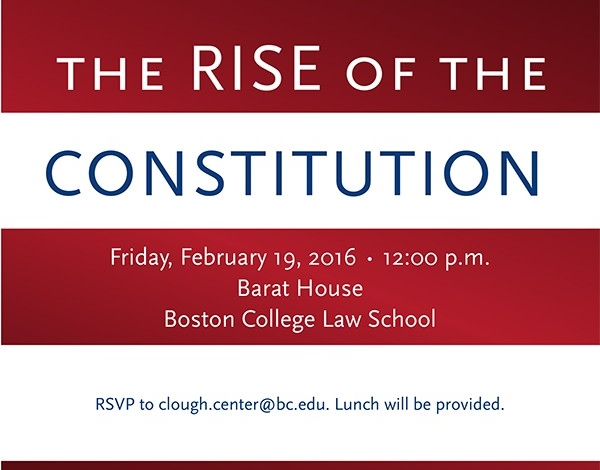
The Rise of the Constitution
Friday, February 19, 2016
12:00 p.m.
Barat House, Boston College Law School
In contemporary American politics, the Constitution enjoys widespread public support. However, this has not always been the case in national history. In fact, the dominance and substantive meaning of constitutional veneration is a relatively recent development -- the product of a series of interconnected political struggles between the American emergence onto the global stage with the Spanish-American War and World War I and the fallout of student and civil rights protest in the 1970s. The rise of modern constitutional veneration is ultimately a story of how the document became synonymous with a once highly embattled view of national identity and, through that process, effectively rose above meaningful political opposition.
The lecture will explore how the Constitution rose above dissent and, as a result, what the implications have been for public life, such as: how did our current consensus emerge; to what degree did such acceptance depend on the active suppression of alternatives; and what are the implications of this consensus and its history for contemporary political discourse and institutional possibilities? All these questions seek to explain how the Constitution came to signify national purpose—one grounded in universal equality—which a century ago existed only at the margins of American politics.
Aziz Rana is currently a Professor at Cornell Law School. He received a Ph.D. in Political Science from Harvard and a JD from Yale. His research and teaching center on American constitutional law and political development, with a particular focus on how shifting notions of race, citizenship, and empire have shaped legal and political identity since the founding. His book, The Two Faces of American Freedom boldly reinterprets the American political tradition from the colonial period to modern times, placing issues of race relations, immigration, and presidentialism in the context of shifting notions of empire and citizenship. Today, while the U.S. enjoys tremendous military and economic power, citizens are increasingly insulated from everyday decision-making. This was not always the case. America, Aziz Rana argues, began as a settler society grounded in an ideal of freedom as the exercise of continuous self-rule—one that joined direct political participation with economic independence. However, this vision of freedom was politically bound to the subordination of marginalized groups, especially slaves, Native Americans, and women. These practices of liberty and exclusion were not separate currents, but rather two sides of the same coin. His current book manuscript explores the modern rise of constitutional veneration in the twentieth century -- especially against the backdrop of growing American global authority -- and how veneration has influenced the boundaries of popular politics. He has written essays and op-eds for such venues as The New York Times, The Nation, Salon.com, CNN.com, Jacobin, and N+1. He has recently published articles and chapter contributions (or has them forthcoming) with Yale University Press, California Law Review, and Texas Law Review among others.
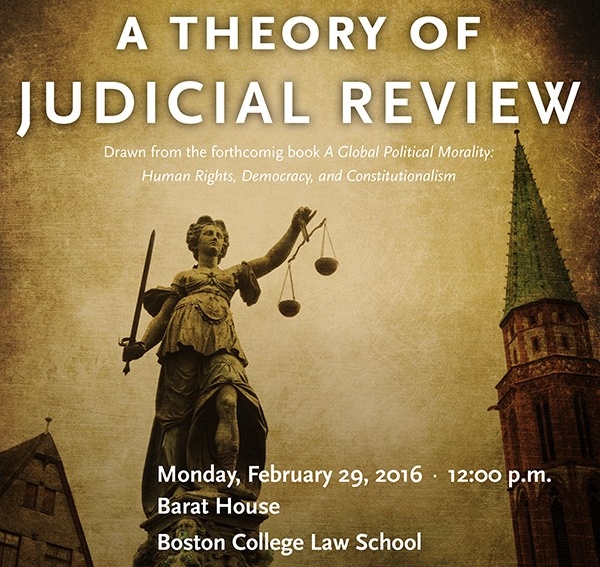
A Theory of Judicial Review
Monday, February 29, 2016
12:00 p.m.
Barat House, Boston College Law School
Since the end of the Second World War, there has emerged what never before existed: a truly global morality. Some of that morality – the morality of human rights – has become entrenched in the constitutional law of the United States. Michael Perry's latest book, "Human Rights in the Constitutional Law of the United States" explains the morality of human rights and elaborates on three internationally recognized human rights that are embedded in U.S. constitutional law: the right not to be subjected to cruel, inhuman, or degrading punishment; the right to moral equality; and the right to religious and moral freedom. The implications of one or more of these rights for three great constitutional controversies – capital punishment, same-sex marriage, and abortion – are discussed in-depth. In his lecture, Perry addresses the question of the proper role of the Supreme Court of the United States in adjudicating these controversies, and ways in which Judicial Review informs global morality.
Michael Perry is the Robert W. Woodruff Professor of Law at Emory University. He specializes in Constitutional Law, Human Rights, and Law and Religion. He is the author of twelve books and over eighty articles and essays. His most recent titles include: Human Rights in the Constitutional Law of the United States (2013); Toward a Theory of Human Rights: Religion, Law, Courts (2007); Constitutional Rights, Moral Controversy, and the Supreme Court (2009); and The Political Morality of Liberal Democracy (2010).
Perry did his undergraduate studies at Georgetown University, majoring in philosophy and minoring in theology (A.B., 1968). He studied law at Columbia University (J.D., 1973), and then served as law clerk to U.S. District Judge Jack B. Weinstein (1973-74) and, a year later, to U.S. Circuit Judge Shirley M. Hufstedler (1974-75). Before coming to Emory, Perry was the inaugural occupant of the Howard J. Trienens Chair in Law at Northwestern University (1990–97), where he taught for fifteen years (1982–97). He then held the University Distinguished Chair in Law at Wake Forest University (1997–2003). Perry began his teaching career at the Ohio State University College of Law (1975–82) and has taught as a visiting professor at a number of prestigious law schools.
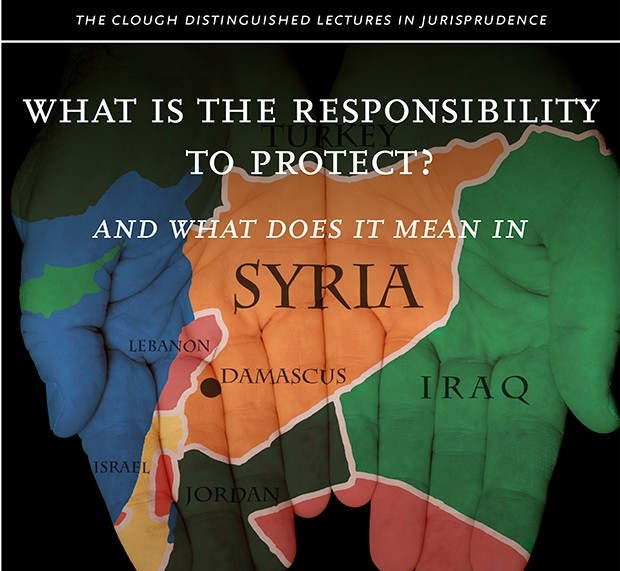
What is the Responsibility to Protect? And What Does It Mean in Syria?
Tuesday, April 5, 2016
6:00 p.m.
Fulton Hall, Room 511
Michael Walzer is Professor Emeritus of Social Science at the Institute for Advanced Study in Princeton, NJ. As a professor, author, editor, and lecturer, Michael Walzer has addressed a wide variety of topics in political theory and moral philosophy: political obligation, just and unjust war, nationalism and ethnicity, economic justice and the welfare state. His books (among them Just and Unjust Wars, Spheres of Justice, The Company of Critics, Thick and Thin: Moral Argument at Home and Abroad, and On Toleration) and essays have played a part in the revival of practical, issue-focused ethics and in the development of a pluralist approach to political and moral life. For more than three decades Walzer served as co-editor of Dissent, now in its 61st year. His articles and interviews frequently appear in the world’s foremost newspapers and journals. He is currently working on the third volume of The Jewish Political Tradition, a comprehensive collaborative project focused on the history of Jewish political thought. A new book, The Paradox of Liberation: Secular Revolutions and Religious Counterrevolutions was published in March of 2015.
The Visible Arts: Making Democracy Visible from Clough Center on YouTube.
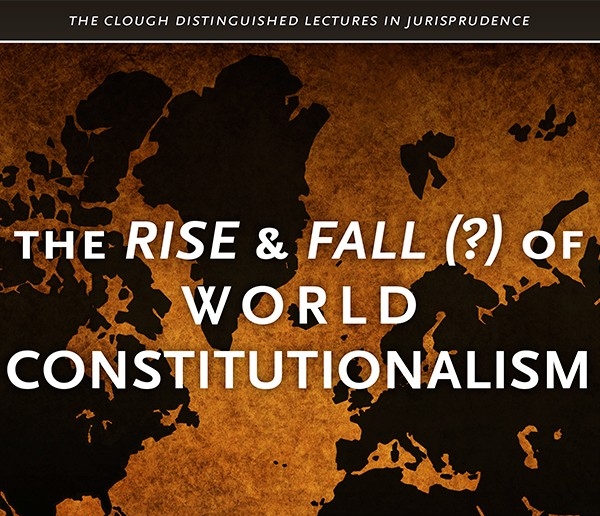
The Rise and Fall (?) of World Constitutionalism
Thursday, April 14, 2016
5:00 p.m.
Barat House, Boston College Law School
Bruce Ackerman is Sterling Professor of Law and Political Science at Yale, and the author of fifteen books that have had a broad influence in political philosophy, constitutional law, and public policy. His major works include Social Justice in the Liberal Stateand his multivolume constitutional history, We the People. His most recent books are We the People: The Civil Rights Revolution (2014), The Decline and Fall of the American Republic (2010), The Failure of the Founding Fathers (2005), and Before the Next Attack (2006). His book, The Stakeholder Society (with Anne Alstott), served as a basis for Tony Blair’s recent introduction of child investment accounts in the United Kingdom, and his book, Deliberation Day (with James Fishkin) served as a basis for “PBS Deliberation Day”, a national series of citizen deliberations produced by McNeill-Lehrer on national television for the 2004 elections. In 2010, he was named by Foreign Policy magazine to its list of top global thinkers. He also writes for the general public, contributing frequently to The New York Times, Washington Post and The Los Angeles Times, and has served, without charge, as a lawyer on matters of public importance. He was a lead witness for President Clinton before the House Judiciary Committee’s Impeachment Hearings, and a principal spokesman for Al Gore before the Florida legislature during the election crisis of 2000. Professor Ackerman is a member of the American Law Institute and the American Academy of Arts and Sciences. He is a Commander of the French Order of Merit, and the recipient of the American Philosophical Society’s Henry Phillips Prize for lifetime achievement in Jurisprudence.

Music and the Culture of Democracy
Thursday, April 21, 2016
6:00 p.m.
Devlin Hall, Room 101
Music is considered the most accessible and democratic of the arts, yet many present-day venues struggle for audience, and critics and performers alike decry the commercial manipulation of the listener. Kim Kashkashian, Scott Poulson-Bryant, Elijah Wald and Edward Hirsch explore the principles that are expressed in a thriving musical language, from classical to hip-hop, and that inform music’s role within a flourishing democratic culture.
Edward Hirsch is an American poet and critic. Hirsch is the recipient of an Academy of Arts and Letters Award, an Ingram Merrill Foundation Award, a Lila Wallace-Reader’s Digest Writers’ Award, and the Rome Prize from the American Academy in Rome. In 2008, he was elected a Chancellor of the Academy of American Poets. He currently serves as the president of the John Simon Guggenheim Memorial Foundation.
Hirsch’s first collection of poems, For the Sleepwalkers (1981), received the Delmore Schwartz Memorial Award from New York University and the Lavan Younger Poets Award from the Academy of American Poets. His second collection, Wild Gratitude (1986), won the National Book Critics Award. Since then, he has published six additional books of poems: The Night Parade (1989), Earthly Measures(1994), On Love (1998), Lay Back the Darkness (2003), Special Orders (2008), and The Living Fire: New and Selected Poems (2010), which brings together thirty-five years of poems. Hirsch is also the author of five prose books, including A Poet’s Glossary (2014), Poet’s Choice (2006), How to Read a Poem and Fall in Love with Poetry (1999); and is the editor of Theodore Roethke’s Selected Poems (2005) and co-editor of The Making of a Sonnet: A Norton Anthology (2008).
Hirsch has been was awarded fellowships from the Guggenheim Foundation, the MacArthur Foundation, and the National Endowment for the Arts. Hirsch taught for six years in the English department at Wayne State University and seventeen years in the Creative Writing Program at the University of Houston. Hirsch was educated at Grinnell College and the University of Pennsylvania, where he received a Ph.D. in Folklore.
Kim Kashkashian is a Grammy-award winning Armenian- American violist. She won a 2013 Grammy Award for Best Classical Instrumental Solo for the 2012 album Kurtág/Ligeti: Music for Viola. As a soloist, she has appeared with the great orchestras of Berlin, London, Vienna, Milan, New York, and Cleveland, and in recital at the Metropolitan Museum of New York, Kaufmann Hall, New England Conservatory’s Jordan Hall, as well as in Philadelphia, Pittsburgh, Cleveland, Frankfurt, Berlin, Paris, Athens, and Tokyo.
Kashkashian has been featured on over 30 albums and performs pieces from both classical and contemporary composers, working with Gidon Kremer, Yo Yo Ma, the Vienna Philharmonic, and Nikolaus Harnoncourt, among others. Kashkashian's recording, with Robert Levin of the Brahms Sonatas, won the Edison Prize in 1999. Her June 2000 recording of concertos by Bartók, Eötvös and Kurtág won the 2001 Cannes Classical Award for a premiere recording by soloist with orchestra. She currently teaches at the New England Conservatory. She won the 2nd Prize at the 1980 Loinel Tertis International Viola Competition and the 1980 ARD International Music Competition in Munich.
Kashkashian studied the viola with Karen Tuttle, and also studied at the Interlochen Center for the Arts. She received a B.M. at the Peabody Conservatory of Music and an M.M. at the New School of Music Philadelphia. She is a former faculty member of the University of Indiana and conservatories in Freiburg and Berlin in Germany. Kashkahian is a founding member of Music for Food, an initiative by musicians to fight hunger in their home countries.
Scott Poulson-Bryant is an award-winning American journalist and author. He is best known for covering trends in urban youth and popular culture. Poulson-Bryant’s journalism, profiles, reviews, and essays have appeared in the New York Times, the Village Voice, Rolling Stone, Spin, Essence, Ebony, and The Source, among others. He is the author of HUNG: A Meditation on the Measure of Black Men in America (2006) and The VIPs: A Novel (2011). Poulson-Bryant’s short stories and articles have been anthologized inAnd It Don't Stop: The Best American Hip-Hop Journalism of the Last 25 Years, Kevin Powell's Step into a World: A Global Anthology of the New Black Literature, Marita Golden and E. Lynn Harris' GUMBO, and Rachel Kramer Bussell's Best Sex Writing 2008. His most recent essay, “Put Some Bass in Your Walk: Notes on Queerness, Hip Hop and the Spectacle of the Undoable,” was published byPalimpsest: A Journal on Women, Gender, and the Black International in 2013.
In 1992, Poulson-Bryant co-founded VIBE, a music and entertainment magazine which predominantly features R&B and hip-hop music artists and actors. He has also served as a staff writer of SPIN and as editorial director of GIANT magazine. Poulson-Bryant’s ground-breaking VIBE profiles of Sean "Puff Daddy" Combs (1992) and De La Soul (1993) won the ASCAP Deems Taylor Awards for Excellence in Music Journalism. His profiles also won the Best Feature Writing award from the New York chapter of the National Association of Black Journalists.
Poulson-Bryant graduated from Brown University in 2008 and is currently working towards his Ph.D. in American Studies at Harvard University.
Elijah Wald started playing guitar at age 7, went to New York at age 17 to study with Dave Van Ronk, and spent much of the next twenty years hitchhiking and performing all over North America and Europe, as well as much of Asia and Africa, including several months studying with the Congolese guitar masters Jean-Bosco Mwenda and Edouard Masengo. He has worked as an accompanist to Van Ronk, Eric Von Schmidt, and the African American string band master Howard Armstrong, and recorded two solo albums: Songster, Fingerpicker, Shirtmakerand Street Corner Cowboys.
In the early 1980s Elijah began writing on roots and world music for the Boston Globe, publishing over a thousand pieces before he left in 2000, his work has appeared in numerous newspapers and magazines. Wald has authored dozens of books, including: Escaping the Delta: Robert Johnson and the Invention of the Blues; How the Beatles Destroyed Rock ’n’ Roll: An Alternative History of American Popular Music; Narcocorrido: A Journey into the Music of Drugs, Guns, and Guerrillas; and The Mayor of MacDougal Street, a memoir with Dave Van Ronk that inspired the Coen Brothers' movie Inside Llewyn Davis. He has won a Grammy Award for his album notes to The Arhoolie Records 40th Anniversary Box, for which he was also nominated as a producer, and his books have won many awards, including an ASCAP-Deems Taylor award and an honorable mention for the American Musicological Society’s Otto Kinkeldey award. He has an interdisciplinary PhD in ethnomusicology and sociolinguistics, and taught for several years in the musicology department at UCLA. Wald is currently based near Boston, wrinting, traveling to speaking engagements around the US and abroad, and performing in a duo with his wife, clarinetist Sandrine Sheon.
FALL 2015 LECTURES & CONFERENCES
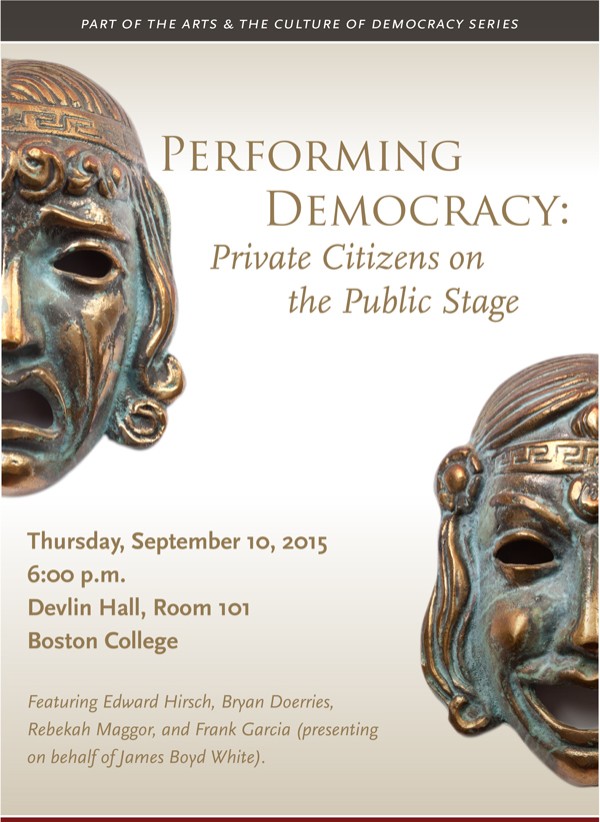
Performing Democracy: Private Citizens on the Public Stage
Thursday, September 10, 2015
6:00 p.m.
Devlin Hall, Room 101
The public performance of democracy and theater grew up together in ancient Greece, and their roots are still fruitfully intertwined. As legal scholar James Boyd White reminds us, we want to affirm publicly the justice or injustice of what has happened to us, and of what we see around us, across both time and geography. The need for democracy to be performed in order to thrive remains as true today as in classical Athens. This conversation will explore how we are expressing our creative possibilities as citizens when we engage with theater in the 21st century.
Edward Hirsch is an American poet and critic. Hirsch is the recipient of an Academy of Arts and Letters Award, an Ingram Merrill Foundation Award, a Lila Wallace-Reader’s Digest Writers’ Award, and the Rome Prize from the American Academy in Rome. In 2008, he was elected a Chancellor of the Academy of American Poets. His most recent book of poetry is Gabriel: A Poem (2014), which was long-listed for the 2014 National Book Award. He currently serves as the president of the John Simon Guggenheim Memorial Foundation.
Edward Hirsch’s first collection of poems, For the Sleepwalkers (1981), received the Delmore Schwartz Memorial Award from New York University and the Lavan Younger Poets Award from the Academy of American Poets. His second collection, Wild Gratitude (1986), won the National Book Critics Award. Since then, he has published six additional books of poems: The Night Parade (1989), Earthly Measures (1994), On Love (1998), Lay Back the Darkness (2003), Special Orders (2008), and The Living Fire: New and Selected Poems (2010), which brings together thirty-five years of poems. Hirsch is also the author of five prose books, including A Poet’s Glossary (2014), Poet’s Choice (2006), How to Read a Poem and Fall in Love with Poetry (1999), and is the editor of Theodore Roethke’s Selected Poems (2005) and co-editor of The Making of a Sonnet: A Norton Anthology (2008).
Hirsch has been was awarded fellowships from the Guggenheim Foundation, the MacArthur Foundation, and the National Endowment for the Arts. Hirsch taught for six years in the English department at Wayne State University and seventeen years in the Creative Writing Program at the University of Houston. Hirsch was educated at Grinnell College and the University of Pennsylvania, where he received a Ph.D. in Folklore.
Bryan Doerries is a writer, director, translator, and the founder of Theater of War, a project that presents readings of ancient Greek plays to service members, veterans, caregivers, and families to help them initiate conversations about the visible and invisible wounds of war. Doerries' forthcoming book, The Theater of War: What Ancient Greek Tragedies Can Teach Us Today, will be published by Alfred A. Knopf in September 2015, along with a volume of his translations of ancient Greek tragedies, entitled All That You’ve Seen Here is God.
Doerries is also the co-founder of Outside the Wire, a social impact company that uses theater and a variety of other media to address pressing public health and social issues, such as combat-related psychological injury, end-of-life care, prison reform, domestic violence, political violence, recovery from natural and man-made disasters, and the de-stigmatization of addiction. He is a self-described “evangelist” of classical literature and emphasizes its relevance to our lives today, especially in helping individuals and communities heal from suffering and loss.
Doerries previously served as the director of programs at the Alliance for Young Artists and Writers, an organization in New York that administers the Scholastic Art and Writing Awards. In addition to his work in theater, Bryan lectures on his work at colleges and universities. Doerries received his B.A. from Kenyon College and received a master's degree in theater directing from the University of California, Irvine.
Frank J. Garcia is Professor of Law and Dean’s Global Fund Scholar at the Boston College Law School. Professor Garcia studied law, literature and the humanities at the Michigan Law School under Professor Joseph Vining, a colleague and collaborator of James Boyd White, and is part of an international group of scholars interested in contemporary applications of White’s work to a range of legal subjects including international economic law, Garcia’s research area. This group includes Professor Fiona Smith of Warwick University, who spoke on White’s work in the Clough Series last year.
A Fulbright Scholar, Garcia has lectured widely on globalization and international economic law in Europe, South America and the Asia/Pacific region. Professor Garcia has held various leadership positions within the American Society of International Law, and currently sits on the editorial board of the Journal of International Economic Law, where he is Book Review Editor. He is the author, most recently, of “Between Cosmopolis and Community: Globalization and the Emerging Basis for Global Justice,” published in the NYU Journal of International Law and Politics, and Global Justice and International Economic Law: Three Takes, a monograph published by Cambridge University Press.
Professor Garcia will be discussing the work of James Boyd White at this event.
Rebekah Maggor is a director, translator, and theatre scholar. She creates and writes about theatre that challenges entrenched power structures and makes room for alternative visions of the future. Recently she has focused in particular on contemporary Egyptian and Palestinian playwriting and the grassroots and unmediated perspectives these dramatic texts provide. As a 2014 Fulbright scholar in the Middle East and North Africa Regional Research Program she studied Palestinian theatre and performance in the West Bank and Israel. She is co-organizer of the 2015 ReOrient Festival forum “Theatre Between Home and Exile: New Palestinian Voices,” funded by the Doris Duke Foundation. She co-edited, co-translated and wrote the introduction to the forthcoming anthology Tahrir Plays and Performance Texts from the Egyptian Revolution (Seagull Books/University of Chicago Press), which was recognized with a Literature in Translation Fellowship from the National Endowment for the Arts. She received a B.A. from Columbia University, an M.F.A. in theatre from the Moscow Art Theatre School, and a certificate in advanced theatre training from the American Repertory Theater Institute at Harvard University. She has taught at Harvard, Vanderbilt, and is currently an affiliated scholar at the Charles Warren Center at Harvard University.
James Boyd White is an American law professor, literary critic, scholar, and philosopher who is credited for founding the “Law and Literature” movement. White is a graduate of Amherst College, Harvard Law School, and Harvard Graduate School, where he obtained an M.A. in English. After graduation from law school, White spent a year as a Sheldon Fellow in Europe and practiced law in Boston for two years. He began his teaching career at the University of Colorado Law School and also was a professor at both the Law School and College of the University of Chicago.
He has published numerous books: The Legal Imagination (1973), Constitutional Criminal Procedure (1976), When Words Lose Their Meaning: Constitutions and Reconstitutions of Language, Character, and Community (1984), Heracles' Bow: Essays in the Rhetoric and Poetics of the Law (1985), Justice as Translation: An Essay in Cultural and Legal Criticism(1990), "This Book of Starres": Learning to Read George Herbert (1994), Acts of Hope: The Creation of Authority in Literature, Law, and Politics (1994), From Expectation to Experience: Essays on Law and Legal Education (2000), The Edge of Meaning (2001); and in 2006, both Living Speech: Resisting the Empire of Force and an edited volume, How Should We Talk About Religion?
White has served as a governor of the Chicago Council of Lawyers and is a member of the American Law Institute and the American Academy of Arts and Sciences. He has received fellowships from the Guggenheim Foundation and the National Endowment for the Humanities, and was a Phi Beta Kappa Visiting Scholar in 1997-98. He is currently a professor of English emeritus and the L. Hart Wright Collegiate Professor.
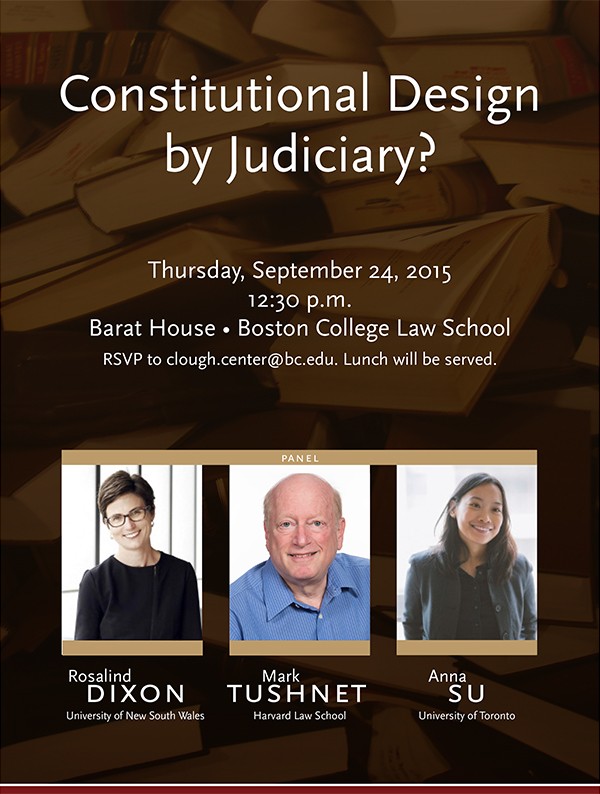
Panel: Constitutional Design by Judiciary?
Thursday, September 24, 2015
12:30 p.m.
Barat House
Boston College Law School
Rosalind Dixon is a Professor of Law, at the University of New South Wales, Faculty of Law. She earned her BA and LLB from the University of New South Wales, and was an associate to the Chief Justice of Australia, the Hon. Murray Gleeson AC, before attending Harvard Law School, where she obtained an LLM and SJD. Her work focuses on comparative constitutional law and constitutional design, theories of constitutional dialogue and amendment, socio-economic rights and constitutional law and gender, and has been published in leading journals in the US, Canada, the UK and Australia, including the Cornell Law Review, University of Pennsylvania Journal of Constitutional Law, International Journal of Constitutional Law, American Journal of Comparative Law, Osgoode Hall Law Journal, Oxford Journal of Legal Studies and Sydney Law Review. She is co-editor, with Tom Ginsburg, of a leading handbook on comparative constitutional law, Comparative Constitutional Law (Edward Elgar, 2011), and a related volume, Comparative Constitutional Law in Asia (Edward Elgar, 2014), co-editor (with Mark Tushnet and Susan Rose-Ackermann) of the Edward Elgar series on Constitutional and Administrative Law, on the editorial board of the Public Law Review, and associate editor of the Constitutions of the World series for Hart publishing. Dixon is a member of the Gilbert + Tobin Centre of Public Law and deputy director of the Herbert Smith Freehills Initiative on Law and Economics. She previously served as an assistant professor at the University of Chicago Law School. Her areas of expertise include constitutional law, comparative constitutional law, constitutional design, constitutional amendment, socio-economic rights, and law and gender.
Professor Mark Tushnet, who graduated from Harvard College and Yale Law School and served as a law clerk to Justice Thurgood Marshall, specializes in constitutional law and theory, including comparative constitutional law. His research includes studies examining (skeptically) the practice of judicial review in the United States and around the world. He also writes in the area of legal and particularly constitutional history, with works on the development of civil rights law in the United States and (currently) a long-term project on the history of the Supreme Court in the 1930s.
Professor Tushnet's areas of interest include Civil Rights and Civil Liberties: Civil Rights History; Legal History: Twentieth Century American Legal History; Constitutional Law; Comparative and Foreign Law: Comparative Constitutional Law; Legal History: Legal History of U.S. Slavery. His publications include The New Constitutional Order (Princeton University Press 2003), The Oxford Handbook of Legal Studies ( Mark Tushnet & Peter Cane eds., Oxford 2003), and "Defending Korematsu?: Reflections on Civil Liberties in Wartime," Wisconsin Law Review 273 (2003).
Anna Su's primary areas of research include the law and history of international human rights law, U.S. constitutional law (First Amendment), and law and religion. Her research has appeared in the Vanderbilt Law Review, the International Journal of Constitutional Law and the Journal of the History of International Law.
Anna holds an SJD from Harvard Law School where her dissertation was awarded the John Laylin Prize for best paper in international law. She received her JD and AB degrees from the Ateneo de Manila University in the Philippines. Prior to coming to Toronto, she held a postdoctoral fellowship at the Baldy Center for Law and Social Policy based in SUNY Buffalo Law School, and a graduate fellowship in ethics with the Edmond J. Safra Center for Ethics at Harvard University. She worked as a law clerk for the Philippine Supreme Court and was a consultant to the Philippine government negotiating panel with the Moro Islamic Liberation Front.
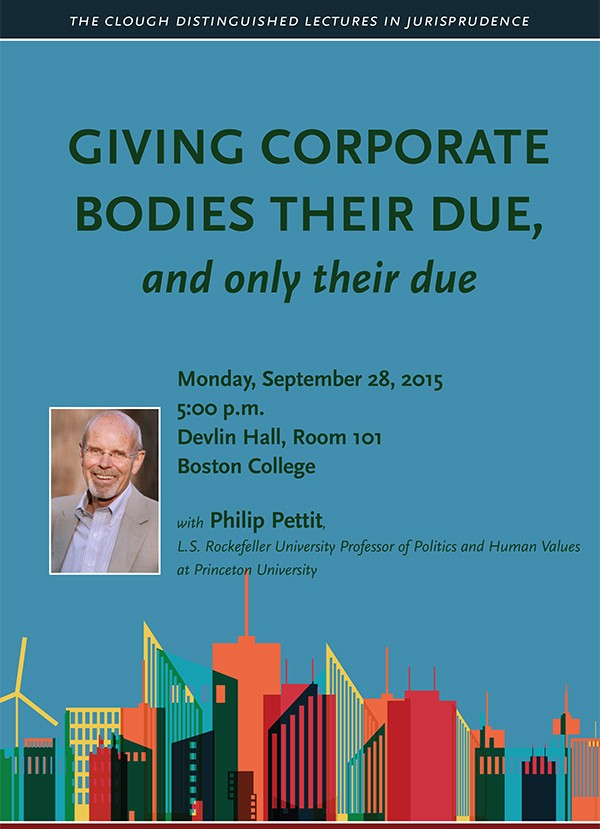
Giving Corporate Bodies their Due, and Only their Due with Philip Pettit
Monday, September 28, 2015
5:00 p.m.
Devlin Hall, Room 101
Philip Pettit is L.S. Rockefeller University Professor of Politics and Human Values at Princeton University, where he has taught political theory and philosophy since 2002, and for a period that began in 2012-13 holds a joint position as Distinguished University Professor of Philosophy at the Australian National University, Canberra. Born and raised in Ireland, he was a lecturer in University College, Dublin, a Research Fellow at Trinity Hall, Cambridge, and Professor of Philosophy at the University of Bradford, before moving in 1983 to the Research School of Social Sciences, Australian National University; there he held a professorial position jointly in Social and Political Theory and Philosophy until 2002. He was elected fellow of the American Academy of Arts and Sciences in 2009, honorary member of the Royal Irish Academy in 2010 and Corresponding Fellow of the British Academy in 2013; he has long been a fellow of the Australian academies in Humanities and Social Sciences. He holds honorary professorships in Philosophy at Sydney University and Queen's University, Belfast and has been awarded honorary degrees by the National University of Ireland (Dublin), the University of Crete, Lund University, Universite de Montreal, Queen's University, Belfast and the University of Athens. Common Minds: Themes from the Philosophy of Philip Pettit appeared from OUP in 2007, edited by Geoffrey Brennan, R.E.Goodin, Frank Jackson and Michael Smith. He gave the Tanner Lectures on Human Values at Berkeley in April 2015 under the title The Birth of Ethics, which he is currently preparing for publication as a book.
Giving Corporate Bodies Their Due, and Only Their Due from Clough Center on YouTube.
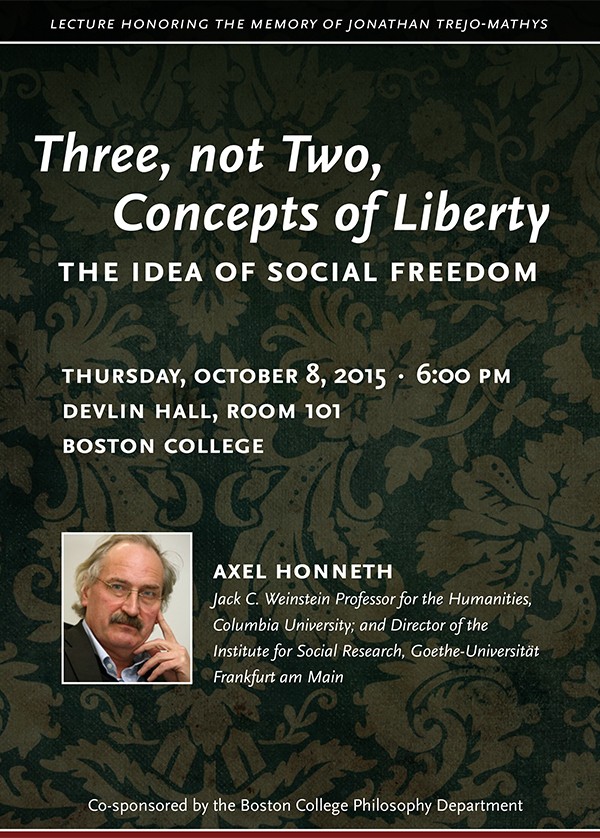
Three, not Two, Concepts of Liberty: The Idea of Social Freedom with Axel Honneth
Thursday, October 8, 2015
6:00 p.m.
Devlin Hall, Room 101
Boston College
Axel Honneth is Professor of Philosophy at the Goethe University Frankfurt and at Columbia University. Since 2001, he is also the Director of the Institute for Social Research. His research interests include Social Philosophy, Ethics and Social Theory; he understands his own work as a contribution to the continuation of Critical Theory.
His English language publications include: The Critique of Power: Reflective Stages in a Critical Social Theory (MIT 1990), The Struggle for Recognition: The Moral Grammar of Social Conflicts (Polity 1995), Redistribution or Recognition? A Political-Philosophical Exchange (co-authored with Nancy Fraser, Verso 2003), Disrespect: The Normative Foundations of Critical Theory (Polity 2007); Pathologies of Reason: On the Legacy of Critical Theory(Columbia UP 2009); The Pathologies of Individual Freedom. Hegel's Social Theory (Princeton UP 2010); The I in We. Studies in the Theory of Recognition (Polity 2012); Freedom's Right. The Social Foundations of Democratic Life(Columbia UP 2014).
Three, Not Two Concept of Liberty: The Idea of Social Freedom from Clough Center on YouTube.
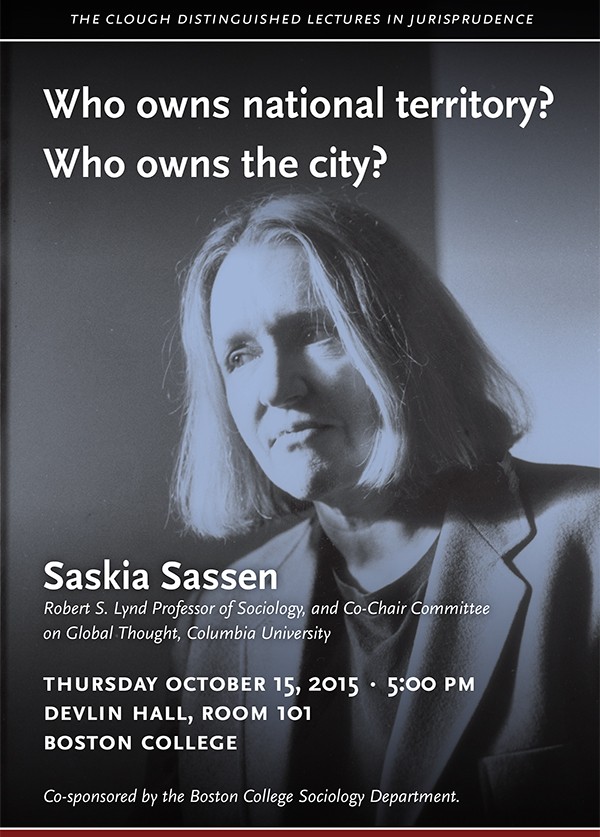
Who owns national territory? Who owns the city?
Thursday, October 15, 2015
5:00 p.m.
Devlin Hall, Room 101
Saskia Sassen is the Robert S. Lynd Professor of Sociology and Co-Chairs The Committee on Global Thought, Columbia University. Her recent books are Territory, Authority, Rights: From Medieval to Global Assemblages (Princeton University Press 2008), A Sociology of Globalization (W.W.Norton 2007), and the 4th fully updated edition of Cities in a World Economy (Sage 2011). The Global City came out in a new fully updated edition in 2001. Her books are translated into twenty-one languages. She is currently working on When Territory Exits Existing Frameworks (under contract with Harvard University Press). She contributes regularly to www.OpenDemocracy.net and The Huffington Post.
Who owns national territory? Who owns the city? from Clough Center on YouTube.
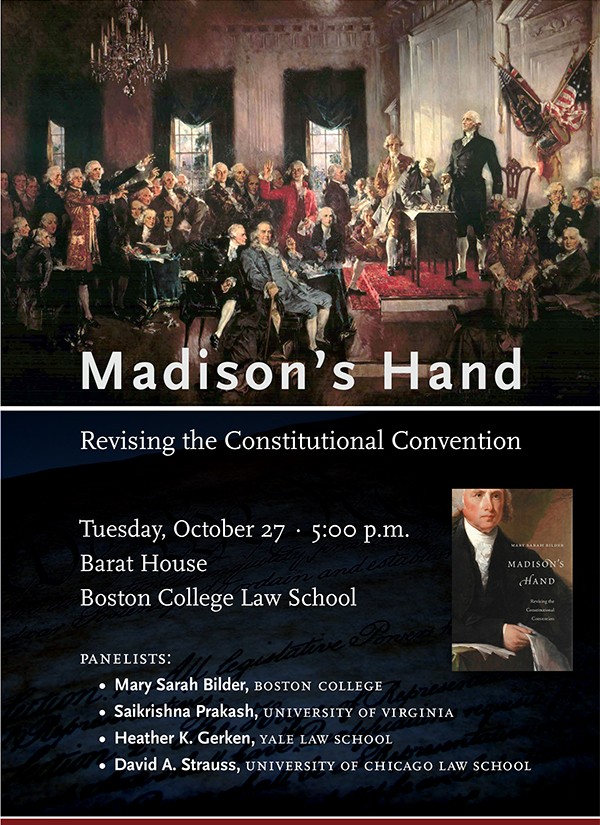
Book Discussion Panel
Madison's Hand: Revising the Constitutional Convention
Tuesday, October 27, 2015
5:00 p.m.
Barat House
Boston College Law School
Professor Mary Sarah Bilder teaches in the areas of property, trusts and estates, and American legal and constitutional history at Boston College Law School. She received her B.A. with Honors (English) and the Dean’s Prize from the University of Wisconsin at Madison, her J.D. (magna cum laude) from Harvard Law School, and her A.M. and Ph.D. from Harvard University in the History of American Civilization. She was a law clerk to the Hon. Francis Murnaghan, Jr., U.S. Court of Appeals, Fourth Circuit. She writes primarily in the areas of constitutionalism and the history of the Constitution, early American legal culture and the legal profession, and the history of the book and legal education. She was the Lucy G. Moses Visiting Professor at Columbia Law School in 2001 and was a visiting professor at Harvard Law School in the spring of 2008. Professor Bilder is a member of the American Law Institute, the Colonial Society of Massachusetts, the Massachusetts Historical Society, and a Fellow of the American Bar Foundation. She is member of the State Bar of Wisconsin (inactive status). She was given the Emil Slizewski Faculty Teaching Award in 2007 and was named Michael and Helen Lee Distinguished Scholar in 2009.
She is the author of The Transatlantic Constitution: Colonial Legal Culture and the Empire(Harvard University Press, 2004), awarded the Littleton-Griswold Award from the American Historical Association. She recently co-edited Blackstone in America: Selected Essays of Kathryn Preyer (Cambridge University Press, 2009). Her articles appear in several important collected volumes of essays and a wide variety of journals, including the Yale Law Journal, the Stanford Law Review, the Yale Journal of Law and the Humanities, the George Washington Law Review, Law and History Review, Law Library Journal, and the Journal of Policy History.
She has received a William Nelson Cromwell Foundation Grant, the Boston College Annual Prize for Scholarship, a Boston College Distinguished Research Award, a Mellon Fellowship in the Humanities, and was a Boston College Law School Fund Scholar. She currently serves on the Editorial Board of Law and History Review, and The Journal of Legal Education, the Board of The New England Quarterly, and is a member of the American Law Institute, the Colonial Society of Massachusetts, and the Massachusetts Historical Society.
Saikrishna Prakash is the James Monroe Distinguished Professor of Law, and Horace W. Goldsmith Research Professor at the University of Virginia. His scholarship focuses on separation of powers, particularly executive powers. He teaches Constitutional Law, Foreign Relations Law and Presidential Powers at the Law School.
Prakash majored in economics and political science at Stanford University. At Yale Law School, he served as senior editor of the Yale Law Journal and received the John M. Olin Fellowship in Law, Economics and Public Policy. After law school, he clerked for Judge Laurence H. Silberman of the U.S. Court of Appeals for the District of Columbia Circuit and for Justice Clarence Thomas of the U.S. Supreme Court. After practicing in New York for two years, he served as a visiting professor at the University of Illinois College of Law and as an associate professor at Boston University School of Law. He then spent several years at the University of San Diego School of Law as the Herzog Research Professor of Law. Prakash has been a visiting professor at the Northwestern University School of Law and the University of Chicago Law School. He also has served as a James Madison Fellow at Princeton University and Visiting Research Fellow at the Hoover Institution at Stanford University.
Heather Gerken is the J. Skelly Wright Professor of Law at Yale Law School. Professor Gerken specializes in election law and constitutional law. She has published in the Harvard Law Review, the Yale Law Journal, the Stanford Law Review, Michigan Law Review, Columbia Law Review, Political Theory, Political Science Quarterly, Roll Call, Legal Affairs, Legal Times, The New Republic, Democracy Journal, and elsewhere. She has served as a commentator for a number of media outlets, including The New York Times, The New Yorker, the L.A. Times, the Chicago Tribune, the Boston Globe, NPR, the Lehrer News Hour, Bill Moyers, CNN, MSNBC, and NBC News. Her most recent scholarship explores questions of election reform, federalism, diversity, and dissent. Her work has been featured in The Atlantic’s “Ideas of the Year” section, the Ideas Section of the Boston Globe, and NPR’s On the Media. It has also been the subject of three academic symposia.
Professor Gerken clerked for Judge Stephen Reinhardt of the 9th Circuit and Justice David Souter of the United States Supreme Court. After practicing for several years, she joined the Harvard faculty in September 2000 and was awarded tenure in 2005. In 2006, she joined the Yale faculty.
Professor Gerken has won teaching awards at both Yale and Harvard, been named one of the nation’s “twenty-six best law teachers” by a book published by the Harvard University Press, was featured in the National Law Journal for balancing teaching and research, won a Green Bag award for legal writing, testified three times before Senate Committee on Rules and Administration, and serves as a trustee for Princeton University. Professor Gerken served as a senior legal adviser in the “Boiler Room” for the Obama for America campaign in 2008 and 2012. Her proposal for creating a “Democracy Index” was incorporated into separate bills by then-Senator Hillary Clinton, then-Senator Barack Obama, and Congressman Israel and turned into reality by the Pew Charitable Trusts, which created the nation’s first Election Performance Index in 2013.
David Strauss is the Gerald Ratner Distinguished Service Professor of Law at the University of Chicago Law School. He graduated from Harvard College summa cum laude in 1973. He then spent two years at Magdalen College, Oxford, on the Marshall Scholarship and received a BPhil in politics from Oxford in 1975. In 1978, he graduated magna cum laude from Harvard Law School, where he was developments editor of the Law Review. Before joining the Law School faculty, he worked as an Attorney-Adviser in the Office of Legal Counsel of the U.S. Department of Justice and was an Assistant to the Solicitor General of the United States.
Strauss joined the Law School faculty in 1985. He has published articles on a variety of subjects, principally in constitutional law and related areas, and recently published The Living Constitution (Oxford University Press, 2010). He is, with Geoffrey Stone and Dennis Hutchinson, editor of the Supreme Court Review. He has been a visiting professor at Harvard and Georgetown. He is a Fellow of the American Academy of Arts and Sciences.
Strauss has argued eighteen cases before the United States Supreme Court. In 1990, he served as Special Counsel to the Committee on the Judiciary of the United States Senate. He is a member of the national Board of Directors of the American Constitution Society. He has also served Chair of the Board of Trustees of the University of Chicago Laboratory Schools and as a member of the Board of Governors of the Chicago Council of Lawyers. In addition to his current teaching interests - constitutional law, federal jurisdiction, elements of the law, and administrative law - he has taught civil procedure and torts.
Madison's Hand: Revising the Constitutional Convention from Clough Center on YouTube.
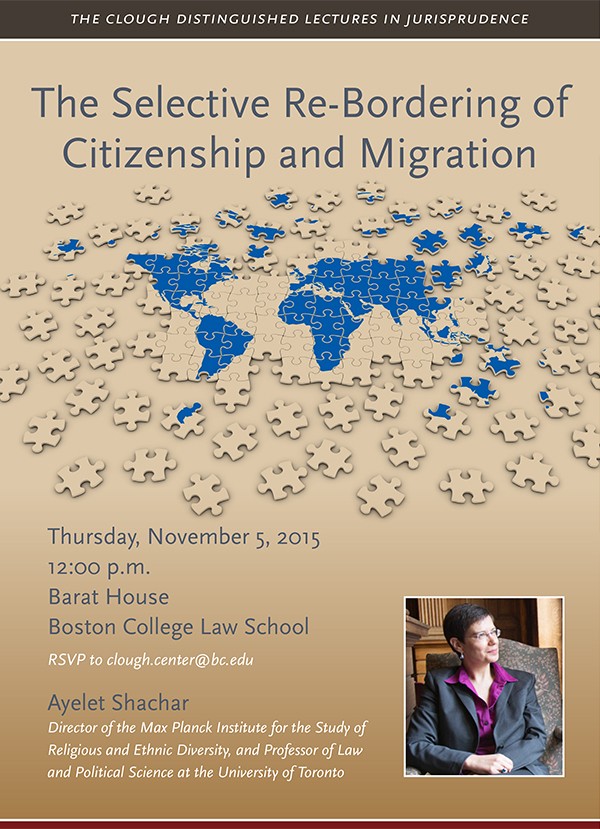
The Selective Re-Bordering of Citizenship and Migration
Thursday, November 5, 2015
12:00 p.m.
Barat House
Boston College Law School
Ayelet Shachar is Director of the Max Planck Institute for the Study of Religious and Ethnic Diversity, and Professor of Law and Political Science at the University of Toronto. She has published and lectured widely on citizenship theory, immigration law, multiculturalism, cultural diversity and women's rights, law and religion in comparative perspective, talent migration and global inequality. She was recently elected a Fellow of the Royal Society of Canada.
Shachar is the award-winning author of Multicultural Jurisdictions: Cultural Differences and Women’s Rights (Cambridge University Press), The Birthright Lottery: Citizenship and Global Inequality (Harvard University Press)—named international ethics notable book in recognition of its “superior scholarship and contribution to the field of international ethics,” and over seventy articles and book chapters published in venues such as the Journal of Political Philosophy, Political Theory, NYU Law Review, Harvard Civil Rights-Civil Liberties Law Review, and the Yale Law Journal. She is the recipient of excellence awards in three different countries, the most recent of which was awarded to her by the Migration & Citizenship Section of the APSA.
Shachar earned her LL.B in law and B.A. in political science, summa cum laude, from Tel Aviv University; LL.M. and J.S.D, both from Yale Law School. Before arriving at Yale, she was law clerk to Chief Justice Aharon Barak of the Supreme Court of Israel. In addition to delivering keynotes and lectures to academic and general audiences on five different continents, Shachar sits on the editorial boards of several peer-reviewed journals in her field and has provided pro-bono expert consultation to judges, governmental commissions and the World Bank, as well as non-governmental organizations specializing in citizenship, immigration and religious toleration. Shachar has held appointments as the Leah Kaplan Visiting Professor in Human Rights at Stanford Law School, and the Jeremiah Smith Jr. Visiting Professor of Law at Harvard Law School. She is also a member of the Max Planck Society – one of the world’s leading research organizations in science and humanities. Her new book, Olympic Citizenship (to be published by Oxford University Press), explores the legal and ethical challenges of international migration, focusing on the highly skilled.
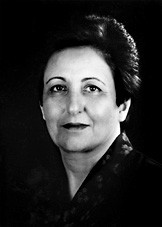
The Clough Center presents Dr. Shirin Ebadi
Tuesday, November 10, 2015
4:00 p.m.
Gasson Hall, Room 100
Dr. Shirin Ebadi J.D., was awarded the 2003 Nobel Peace Prize for her efforts to promote human rights, in particular, the rights of women, children, and political prisoners in Iran. She is the first Muslim woman to receive the Nobel Peace Prize, and only the fifth Muslim to receive a Nobel Prize in any field.
Dr. Ebadi was one of the first female judges in Iran. She served as president of the city court of Tehran from 1975 to 1979 and was the first Iranian woman to achieve Chief Justice status. She, along with other women judges, was dismissed from that position after the Islamic Revolution in February 1979. She was made a clerk in the court she had once presided over, until she petitioned for early retirement. After obtaining her lawyer's license in 1992, Dr. Ebadi set up private practice. As a lawyer, Dr. Ebadi has taken on many controversial cases defending political dissidents and as a result has been arrested numerous times.
In addition to being an internationally-recognized advocate of human rights, she has also established many non-governmental organizations in Iran, including the Million Signatures Campaign, a campaign demanding an end to legal discrimination against women in Iranian law. In January 2006, along with sister Laureate Jody Williams, Dr. Ebadi took the lead in establishing the Nobel Women's Initiative.
Dr. Ebadi is also a university professor and often students from outside Iran take part in her human rights training courses. She has published over 70 articles and 13 books dedicated to various aspects of human rights, some of which have been published by UNICEF. In 2004, she was named by Forbes Magazine as one of the 100 most powerful women in the world.
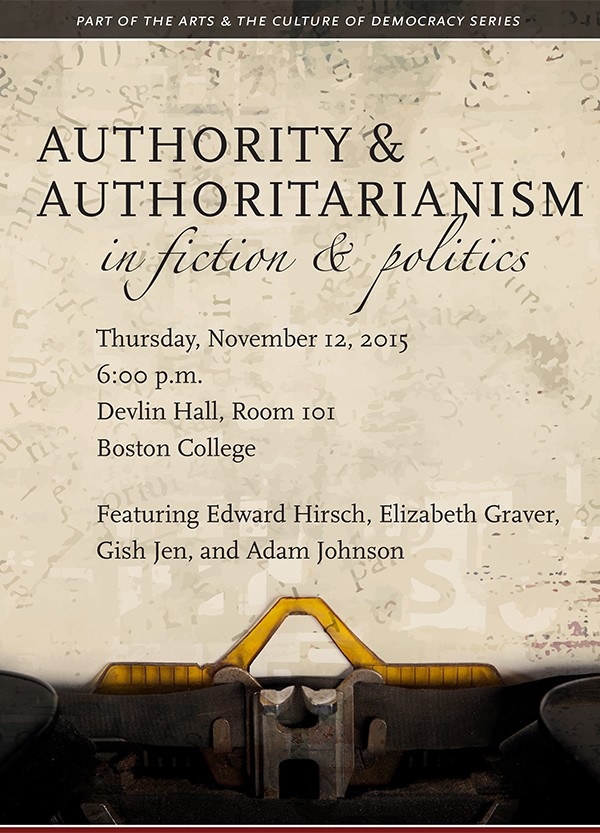
Authority and Authoritarianism in Fiction and Politics
Thursday, November 12, 2015
6:00 p.m.
Devlin Hall, Room 101
Both the authoritative and the authoritarian in literature and law rely on narratives for their claims to legitimacy. Authority, as James Boyd White writes, is a way of talking and thinking, an activity of mind and imagination and art; it receives its fullest definition performatively, as the writer finds a way of using language that creates a community of discourse, and offers the reader a place from which to observe and judge the world itself. What stories are we telling in 21st century fiction and politics? What stories are not being told? This conversation seeks to engage such questions.
Edward Hirsch is a celebrated poet and peerless advocate for poetry. He was born in Chicago in 1950—his accent makes it impossible for him to hide his origins—and educated at Grinnell College and the University of Pennsylvania, where he received a Ph.D. in Folklore. His devotion to poetry is lifelong.
He has received numerous awards and fellowships, including a MacArthur Fellowship, a Guggenheim Fellowship, an Ingram Merrill Foundation Award, a Pablo Neruda Presidential Medal of Honor, the Prix de Rome, and an Academy of Arts and Letters Award. In 2008, he was elected a Chancellor of the Academy of American Poets.
Edward Hirsch’s first collection of poems, For the Sleepwalkers (1981), received the Delmore Schwartz Memorial Award from New York University and the Lavan Younger Poets Award from the Academy of American Poets. His second collection, Wild Gratitude (1986), won the National Book Critics Award.
Edward Hirsch taught for six years in the English Department at Wayne State University and seventeen years in the Creative Writing Program at the University of Houston. He is now president of the John Simon Guggenheim Memorial Foundation.
Elizabeth Graver’s fourth novel, The End of the Point, was long-listed for the 2013 National Book Award in Fiction and selected as a New York Times Notable Book of the Year. Her other novels are Awake, The Honey Thief, and Unravelling. Her story collection, Have You Seen Me?, won the 1991 Drue Heinz Literature Prize. Her work has been anthologized in Best American Short Stories (1991, 2001); Prize Stories: The O. Henry Awards (1994, 1996, 2001), The Pushcart Prize Anthology (2001), and Best American Essays (1998). She teaches at Boston College and is at work on a new project that draws on the Sephardic Jewish history of her family.
Gish Jen is the author of four novels, a collection of short stories and a volume of lectures, Jen has published in The New Yorker, The Atlantic Monthly, and dozens of other periodicals and anthologies, including The Best American Short Stories of 1988, 1995 and 2013, as well as The Best American Short Stories of the Century, edited by John Updike.
Nominated for a National Book Critics’ Circle Award and an International IMPAC Dublin Book Award, her work was also featured in a PBS American Masters’ special on the American novel, and is widely taught. Jen was elected to the American Academy of Arts and Sciences in 2009. She has been awarded a Lannan Literary Award for Fiction, a Guggenheim fellowship, a Radcliffe Institute for Advanced Study fellowship, and numerous other awards. In 2003, an American Academy of Arts and Letters jury comprised of John Updike, Cynthia Ozick, Don DeLillo, and Joyce Carol Oates granted her a five-year Mildred and Harold Strauss Living award; Jen also delivered the Massey lectures in the History of American Civilization at Harvard University in 2012. Her most recent book, Tiger Writing: Art, Culture and the Interdependent Self is based on those lectures.
Adam Johnson is Associate Professor of English with emphasis in creative writing at Stanford University, where he has been a professor since 1999. A Whiting Writers’ Award winner, his work has appeared in Esquire, Harper’s, Playboy, GQ, Paris Review, Granta, Tin House, The New York Times and Best American Short Stories. He is the author of Emporium, a short-story collection, and the novel Parasites Like Us. His books have been translated into twenty-three languages. Johnson was a 2010 National Endowment for the Arts Fellow. His novel The Orphan Master’s Son was published in 2012 by Random House and received the 2013 Pulitzer Prize in fiction. He was also awarded a Guggenheim Fellowship for 2013-14.
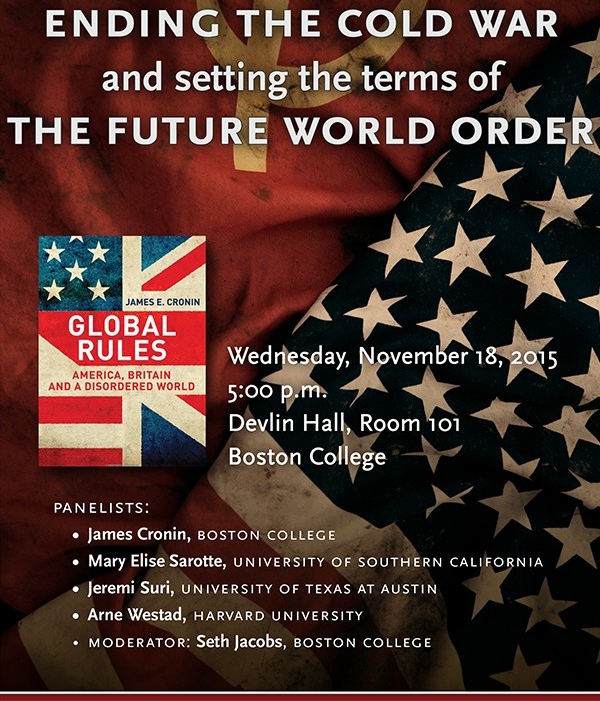
Ending the Cold War and Setting the Terms of the Future World Order
Wednesday, November 18, 2015
5:00 p.m.
Devlin Hall, Room 101
James Cronin teaches modern British and European history at Boston College. Over the past decade his research interests have involved the relationship between states and social structures, political parties, and the rise and fall of the Cold War world order. His most recent book focused on the making of "New Labour" in Britain and its implications for the evolution of social democracy in Europe. He is currently working on a study of British and American foreign policy, and the Anglo-American alliance, since the crisis of the 1970s. Professor Cronin is an associate of the Center for European Studies at Harvard University, where he chairs the British Study Group, and he serves on the editorial boards of the Journal of Social History and British Politics. He has been awarded fellowships by the National Endowment for the Humanities and the German Marshall Fund and is a fellow of the Royal Historical Society.
Mary Elise Sarotte is the author, most recently, of The Collapse: The Accidental Opening of the Berlin Wall, which the Financial Times, theEconomist, and BBC History Magazine (along with other publications) named a "Book of the Year" and CNN's Fareed Zakaria GPS selected as its "Book of the Week." The Collapse appeared on the 25th anniversary of the fall of the Wall, along with related articles and op-eds in Foreign Affairs, The Los Angeles Times, The New York Times, Politico, and other media outlets.
Her previous book, 1989: The Struggle to Create Post-Cold War Europe (2009) was also a Financial Times Book of the Year and became the first book to win both the Ferrell Prize (for distinguished scholarship on U.S. foreign policy) and the Shulman Prize (for distinguished scholarship on Communist foreign policy). 1989 additionally received the DAAD Prize for distinguished scholarship in German and European studies. Sarotte is the author of two other books and a number of scholarly articles as well.
She earned her bachelor’s degree at Harvard University, her doctorate in history at Yale University, and held a postdoctoral fellowship at the Belfer Center at the Harvard Kennedy School. After her postdoc, Sarotte went on to become a White House Fellow, a member of the Institute for Advanced Study in Princeton, and a tenured member of the faculty of the University of Cambridge in England. Sarotte returned to the States to become a member of the faculty at the University of Southern California (USC), where she is Dean’s Professor of History, and a research associate of the Center for European Studies at Harvard University.
Jeremi Suri is the Mack Brown Distinguished Chair for Leadership in Global Affairs at the University of Texas at Austin, where he is a Professor in the Department of History and the Lyndon B. Johnson School of Public Affairs. He is the author and editor of six books on history, international affairs, and foreign policy, including Power and Protest: Global Revolution and the Rise of Detente, Henry Kissinger and the American Century, andLiberty’s Surest Guardian: American Nation-Building from the Founders to Obama. His most recent book, co-edited with Robert Hutchings, is:Foreign Policy Breakthroughs: Cases in Successful Diplomacy. Professor Suri also writes for newspapers and magazines, including the New York Times, the Boston Globe, the Houston Chronicle, the Dallas Morning News, Foreign Affairs, and Wired Magazine. His research and teaching have received numerous awards, including recognition from Smithsonian Magazine as one of American Top Young Innovators. Professor Suri is a frequent public lecturer and appears often on television and radio. He blogs at: http://jeremisuri.net
Odd Arne Westad is the S.T. Lee Professor of U.S.-Asia Relations at Harvard University, where he teaches at the Kennedy School of Government. He is an expert on contemporary international history and on the eastern Asian region.
Before coming to Harvard in 2015, Westad was School Professor of International History at the London School of Economics and Political Science (LSE). While at LSE, he directed LSE IDEAS, a leading centre for international affairs, diplomacy and strategy.
Professor Westad won the Bancroft Prize for The Global Cold War: Third World Interventions and the Making of Our Times. The book, which has been translated into fifteen languages, also won a number of other awards. Westad served as general editor for the three-volume Cambridge History of the Cold War, and is the author of the Penguin History of the World (now in its 6th edition). His most recent book, Restless Empire: China and the World since 1750, won the Asia Society’s book award for 2013.

